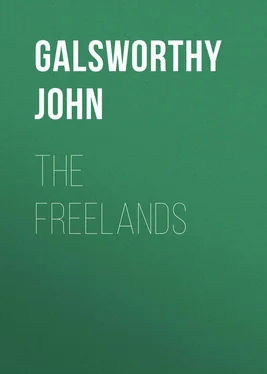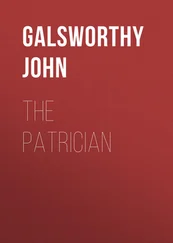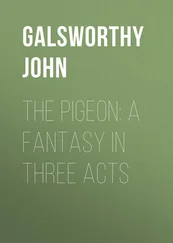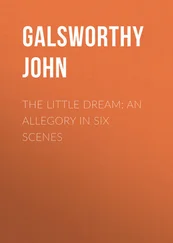John Galsworthy - The Freelands
Здесь есть возможность читать онлайн «John Galsworthy - The Freelands» — ознакомительный отрывок электронной книги совершенно бесплатно, а после прочтения отрывка купить полную версию. В некоторых случаях можно слушать аудио, скачать через торрент в формате fb2 и присутствует краткое содержание. Жанр: foreign_antique, foreign_prose, на английском языке. Описание произведения, (предисловие) а так же отзывы посетителей доступны на портале библиотеки ЛибКат.
- Название:The Freelands
- Автор:
- Жанр:
- Год:неизвестен
- ISBN:нет данных
- Рейтинг книги:5 / 5. Голосов: 1
-
Избранное:Добавить в избранное
- Отзывы:
-
Ваша оценка:
- 100
- 1
- 2
- 3
- 4
- 5
The Freelands: краткое содержание, описание и аннотация
Предлагаем к чтению аннотацию, описание, краткое содержание или предисловие (зависит от того, что написал сам автор книги «The Freelands»). Если вы не нашли необходимую информацию о книге — напишите в комментариях, мы постараемся отыскать её.
The Freelands — читать онлайн ознакомительный отрывок
Ниже представлен текст книги, разбитый по страницам. Система сохранения места последней прочитанной страницы, позволяет с удобством читать онлайн бесплатно книгу «The Freelands», без необходимости каждый раз заново искать на чём Вы остановились. Поставьте закладку, и сможете в любой момент перейти на страницу, на которой закончили чтение.
Интервал:
Закладка:
“Time enough, Nedda!”
“But, Dad, there are such heaps of things, such heaps of people, and reasons, and – and life; and I know nothing. Dreams are the only times, it seems to me, that one finds out anything.”
“As for that, my child, I am exactly in your case. What’s to be done for us?”
She slid her hand through his arm again.
“Don’t laugh at me!”
“Heaven forbid! I meant it. You’re finding out much quicker than I. It’s all folk-music to you still; to me Strauss and the rest of the tired stuff. The variations my mind spins – wouldn’t I just swap them for the tunes your mind is making?”
“I don’t seem making tunes at all. I don’t seem to have anything to make them of. Take me down to see ‘the Tods,’ Dad!”
Why not? And yet – ! Just as in this spring night Felix felt so much, so very much, lying out there behind the still and moony dark, such marvellous holding of breath and waiting sentiency, so behind this innocent petition, he could not help the feeling of a lurking fatefulness. That was absurd. And he said: “If you wish it, by all means. You’ll like your Uncle Tod; as to the others, I can’t say, but your aunt is an experience, and experiences are what you want, it seems.”
Fervently, without speech, Nedda squeezed his arm.
CHAPTER IV
Stanley Freeland’s country house, Becket, was almost a show place. It stood in its park and pastures two miles from the little town of Transham and the Morton Plough Works; close to the ancestral home of the Moretons, his mother’s family – that home burned down by Roundheads in the Civil War. The site – certain vagaries in the ground – Mrs. Stanley had caused to be walled round, and consecrated so to speak with a stone medallion on which were engraved the aged Moreton arms – arrows and crescent moons in proper juxtaposition. Peacocks, too – that bird ‘parlant,’ from the old Moreton crest – were encouraged to dwell there and utter their cries, as of passionate souls lost in too comfortable surroundings.
By one of those freaks of which Nature is so prodigal, Stanley – owner of this native Moreton soil – least of all four Freeland brothers, had the Moreton cast of mind and body. That was why he made so much more money than the other three put together, and had been able, with the aid of Clara’s undoubted genius for rank and station, to restore a strain of Moreton blood to its rightful position among the county families of Worcestershire. Bluff and without sentiment, he himself set little store by that, smiling up his sleeve – for he was both kindly and prudent – at his wife who had been a Tomson. It was not in Stanley to appreciate the peculiar flavor of the Moretons, that something which in spite of their naivete and narrowness, had really been rather fine. To him, such Moretons as were left were ‘dry enough sticks, clean out of it.’ They were of a breed that was already gone, the simplest of all country gentlemen, dating back to the Conquest, without one solitary conspicuous ancestor, save the one who had been physician to a king and perished without issue – marrying from generation to generation exactly their own equals; living simple, pious, parochial lives; never in trade, never making money, having a tradition and a practice of gentility more punctilious than the so-called aristocracy; constitutionally paternal and maternal to their dependents, constitutionally so convinced that those dependents and all indeed who were not ‘gentry,’ were of different clay, that they were entirely simple and entirely without arrogance, carrying with them even now a sort of Early atmosphere of archery and home-made cordials, lavender and love of clergy, together with frequent use of the word ‘nice,’ a peculiar regularity of feature, and a complexion that was rather parchmenty. High Church people and Tories, naturally, to a man and woman, by sheer inbred absence of ideas, and sheer inbred conviction that nothing else was nice; but withal very considerate of others, really plucky in bearing their own ills; not greedy, and not wasteful.
Of Becket, as it now was, they would not have approved at all. By what chance Edmund Moreton (Stanley’s mother’s grandfather), in the middle of the eighteenth century, had suddenly diverged from family feeling and ideals, and taken that ‘not quite nice’ resolution to make ploughs and money, would never now be known. The fact remained, together with the plough works. A man apparently of curious energy and character, considering his origin, he had dropped the E from his name, and – though he continued the family tradition so far as to marry a Fleeming of Worcestershire, to be paternal to his workmen, to be known as Squire, and to bring his children up in the older Moreton ‘niceness’ – he had yet managed to make his ploughs quite celebrated, to found a little town, and die still handsome and clean-shaved at the age of sixty-six. Of his four sons, only two could be found sufficiently without the E to go on making ploughs. Stanley’s grandfather, Stuart Morton, indeed, had tried hard, but in the end had reverted to the congenital instinct for being just a Moreton. An extremely amiable man, he took to wandering with his family, and died in France, leaving one daughter – Frances, Stanley’s mother – and three sons, one of whom, absorbed in horses, wandered to Australia and was killed by falling from them; one of whom, a soldier, wandered to India, and the embraces of a snake; and one of whom wandered into the embraces of the Holy Roman Church.
The Morton Plough Works were dry and dwindling when Stanley’s father, seeking an opening for his son, put him and money into them. From that moment they had never looked back, and now brought Stanley, the sole proprietor, an income of full fifteen thousand pounds a year. He wanted it. For Clara, his wife, had that energy of aspiration which before now has raised women to positions of importance in the counties which are not their own, and caused, incidentally, many acres to go out of cultivation. Not one plough was used on the whole of Becket, not even a Morton plough – these indeed were unsuitable to English soil and were all sent abroad. It was the corner-stone of his success that Stanley had completely seen through the talked-of revival of English agriculture, and sedulously cultivated the foreign market. This was why the Becket dining-room could contain without straining itself large quantities of local magnates and celebrities from London, all deploring the condition of ‘the Land,’ and discussing without end the regrettable position of the agricultural laborer. Except for literary men and painters, present in small quantities to leaven the lump, Becket was, in fact, a rallying point for the advanced spirits of Land Reform – one of those places where they were sure of being well done at week-ends, and of congenial and even stimulating talk about the undoubted need for doing something, and the designs which were being entertained upon ‘the Land’ by either party. This very heart of English country that the old Moretons in their paternal way had so religiously farmed, making out of its lush grass and waving corn a simple and by no means selfish or ungenerous subsistence, was now entirely lawns, park, coverts, and private golf course, together with enough grass to support the kine which yielded that continual stream of milk necessary to Clara’s entertainments and children, all female, save little Francis, and still of tender years. Of gardeners, keepers, cow-men, chauffeurs, footmen, stablemen – full twenty were supported on those fifteen hundred acres that formed the little Becket demesne. Of agricultural laborers proper – that vexed individual so much in the air, so reluctant to stay on ‘the Land,’ and so difficult to house when he was there, there were fortunately none, so that it was possible for Stanley, whose wife meant him to ‘put up’ for the Division, and his guests, who were frequently in Parliament, to hold entirely unbiassed and impersonal views upon the whole question so long as they were at Becket.
Читать дальшеИнтервал:
Закладка:
Похожие книги на «The Freelands»
Представляем Вашему вниманию похожие книги на «The Freelands» списком для выбора. Мы отобрали схожую по названию и смыслу литературу в надежде предоставить читателям больше вариантов отыскать новые, интересные, ещё непрочитанные произведения.
Обсуждение, отзывы о книге «The Freelands» и просто собственные мнения читателей. Оставьте ваши комментарии, напишите, что Вы думаете о произведении, его смысле или главных героях. Укажите что конкретно понравилось, а что нет, и почему Вы так считаете.












